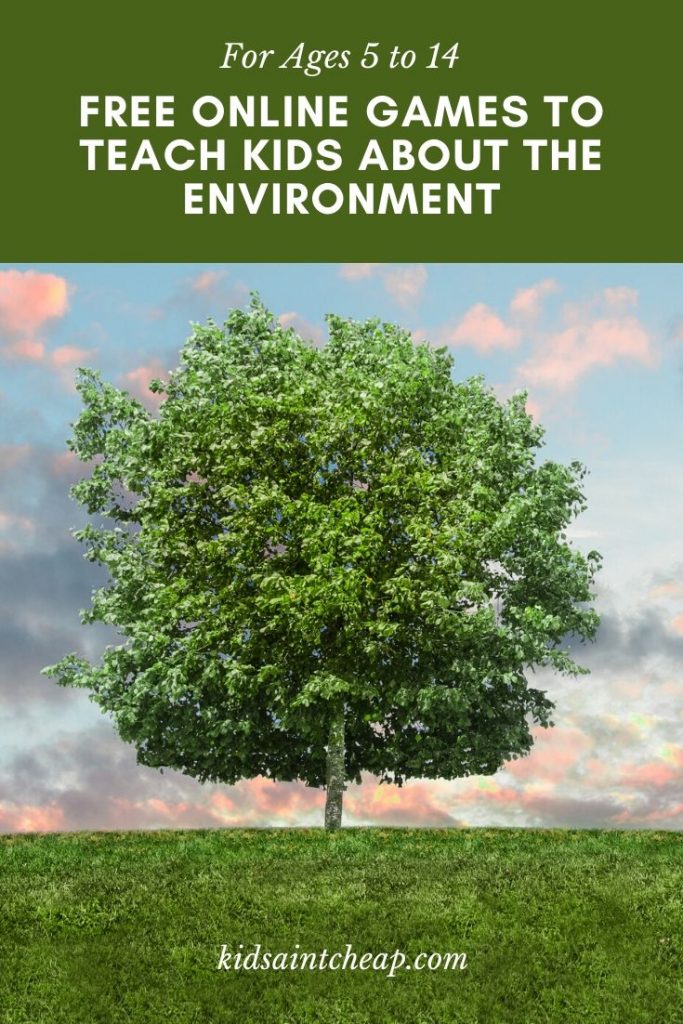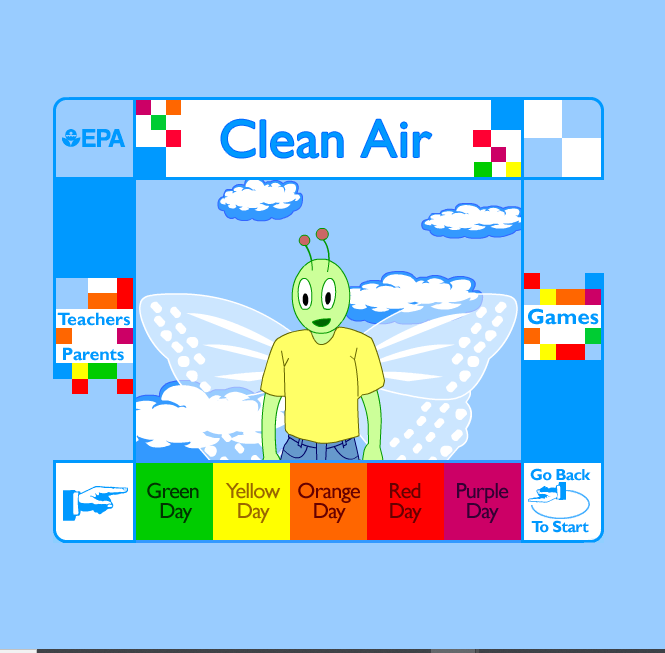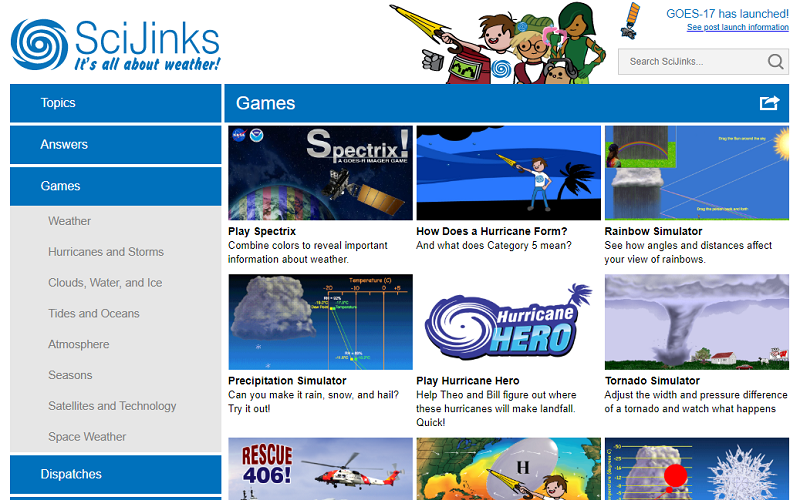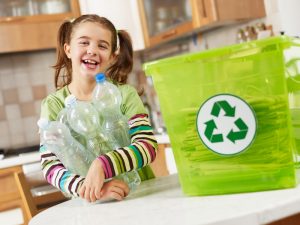If you’re a mom of kids under 12, you know that one of the best ways to teach kids so that they actually remember information is to play games. Games are fun, so kids are eager to play, not knowing (or caring) that they’re actually learning something. If you have science minded kids, there are many free online games to teach kids about the environment.
Free Online Games to Teach Kids about the Environment
There are so many games and so many ways you can teach kids about the environment!
Games for Ages 4 to 7
Even your little children can learn about the environment with these fun games.
Environmental Protection Agency
Choose one of three games for ages 4 to 7 to teach them about air pollution and what the various colors mean—green day, red day, etc.
National Institute of Environmental Health Sciences
There are many, many games on the Kids Environment Kids Health page from the National Institute of Environmental Health Sciences. These games are for kids in 1st to 4th grade. The free online games to teach kids about the environment include:
Climates of the World
Kids match children in a variety of clothes with the climate and country that they live in.
Matching Game
In one of the matching games, kids can match bird songs with the birds that make them.
Do check this site out as there is so much here young kids would like include many different games, jokes, riddles, and songs.
Energy Star
Calling all Dr. Seuss fans! The Energy Star website has a fun game called Join the Lorax. Games include coloring the Lorax characters, completing a word search, and a picture search for energy efficient items.
Games for Ages 8 to 12
SciJinks
The SciJinks site has many different games for kids from grades 3 to 7. This site has 23 games including a hurricane simulator and a tornado simulator (kids will probably enjoy seeing the flying cow spinning around when the tornado hits). Game topics include:
- Weather,
- Hurricanes and Storms,
- Clouds, Water, and Ice,
- Tides and Oceans,
- Atmosphere,
- Seasons,
- Satellites and Technology,
- Space Weather
EPA
For those who prefer more scholarly free games to teach kids about the environment, the EPA has an ozone science crossword puzzle. This puzzle would be perfect for 5th to 7th graders. There are 17 clues and 17 answers to choose from.
Energy Kids
The U.S. Energy Information Administration has all sorts of activities for kids on the part of their website called Energy Kids.
They have fun energy-related riddles such as, “How do energy-conscious people feel about wind power? Answer—they’re blown away.” When my son was in 3rd grade, he would have loved riddles like this.
They also have energy slang terms as well as puzzles (Sudoko, slider puzzles, crosswords and word searches).
For students who love participating in science fairs, the site has science fair experiment ideas for all ages, K-12.
Lastly, the site has suggestions for energy-based field trips as well as a brief description of each site.
NASA Science
For your kids in grades 6-9, Nasa Science has a game to teach your kids about energy flow called Go with the Flow. Kids get to experiment with how salt and heat affect the weather and the water currents.
If your child is interested in learning about space weather, there is also a game for that on the site called Shields Up!
Smithsonian Science Education Center
If you want to teach your kids about the environment, the Smithsonian Science Education Center site has games for kids in grades 3 to 6.
In the game Habitats, children are given a picture of a habitat (habitats range from desert, coral reef, jungle and marsh.) They then can choose from images of three animals to decide what animal belongs in that particular habitat.
Similarly, they also have a game, Home on the Range, that corresponds with 2nd grade learning standards. Kids try to find animals and plants that exist in certain habitats around the United States. If they don’t know the answer, they can click on each animal or plant that is a possible answer and read more about that particular one.
Smokey for Kids
Teach your kids about the dangers of wild fires with the Smokey for Kids site. Not only do kids learn how to prevent wildfires, but they also can play games to reinforce what they learn. Kids might find it especially fun to play the Storymaker Game. They first fill out quite a bit of information personalized to them, and then a story is created using that information.
Water Sense
In the Water Sense game, created by the EPA, lead the water drop through a maze, being careful to avoid water wasters. This game is great for late elementary and early middle school students.
Smithsonian’s National Zoo & Conservation Biology Institute
In the Migration Game, students answer questions about migration. Each question that they answer correctly gets Wanda the Wood Thrush closer to her summer home in Maryland from her winter home in Costa Rica.
Sample multiple choice questions include, “When do Wood Thrushes fly when they are migrating?” and “How long does it take a Wood Thrush to migrate from Costa Rica to Maryland?”
Recycle City
Another site created by the EPA, Recycle City offers two activities for kids. First, there is the Recycle City Challenge, where kids can answer questions about actions people can take to reduce waste and energy use. They can earn points and jump on the leader board.
They can also play the Dumptown Game. The player is in charge of Dumptown and must start programs to reduce waste and encourage recycling. Players will be able to see the financial differences based on the programs they implement.
Final Thoughts
Most kids love playing games, all the better if they’re electronic games. Why not use these free online games to teach kids about the environment to both entertain and educate your children? I’m guessing your kids, if they’re like mine, would be happy to try out these games and learn new jokes and riddles to add to their repertoire.
Melissa is a writer and virtual assistant. She earned her Master’s from Southern Illinois University, and her Bachelor’s in English from the University of Michigan. When she’s not working, you can find her homeschooling her kids, reading a good book, or cooking. She resides in Arizona where she dislikes the summer heat but loves the natural beauty of the area.



